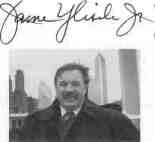
The reason Chicago is still the city on the make
by James Ylisela Jr.
A VIEW FROM CHICAGO

The reason Chicago is still the city on the make
by James Ylisela Jr.
Ask your typical Chicagoan, and
you're likely to hear that Richard M.
Daley has been a pretty good mayor,
I all things considered. The city is
rebuilding, and the schools are on the
rebound. People are working.
Then ask that same city dweller about
the shenanigans at City Hall. Doesn't
the mayor have too much power? What
about all those fat cats getting city
contracts, and aldermen who use their
offices to get rich on the side? To which
might come the quizzical reply: "What's
your point?"
Chicago has always been clout city, and while the latest scandals are highly entertaining, they hardly come as a shock. The Bulls won another championship. Ho hum. The Cubs are waiting 'til next year. Yawn. Our politicians can't be trusted. Tell me something I don't know.
That's just the kind of attitude that makes the rest of the state hate us.
What's worse, all this publicity tends to overshadow the real reason Chicago is still the city on the make. Yes, I'm talking about property taxes.
You scoff, but it's true. Chicago's system of government teeters on the premise that our leaders can do anything, and I mean anything, so long as they don't raise our property taxes. We've given them carte blanche to wink, burrow and steal to keep the city moving forward. Just don't stick us with the check.
|
We've given our leaders carte blanche to wink, burrow and steal to keep the city moving forward. Just don't stick us with the check. |
When you think about it, those city contracts are nothing more than patronage jobs, '90s style.
For two decades. Mayor Richard J. Daley kept the voters happy by running the city's best employment agency. With state and federal money pouring in for urban renewal and the "War on Poverty," public jobs were plentiful, and Daley's ward committeemen handed them out like lollipops. On Election Day, the precinct captains were there to remind you that Streets and Sanitation took Cousin Billy off your hands when no one else would.
Then the bottom fell out. The economy went south, inflation and unemployment soared, the unions went on strike and the feds shut off the spigot. Chicago fell back on its nest egg, the value of its real estate. Property taxes went up, then up again, to pay for schools, to fix potholes and seemingly everything else. Eventually, the voters went bonkers. Today, raising property taxes is political suicide.
So the new Daley Administration got creative. Now we sell bonds to fund our major projects and use Tax Increment Financing to target improvements in specific areas. Both methods rely on property taxes, but the voters are none the wiser. Most bonds are backed by property taxes, but the payments are stretched out for years. TIFs hog all the tax revenue in an area instead of doling it out the usual way (for schools and parks, or my personal favorite, the mosquito abatement district).
The result is a lot of money, not for public jobs, but for private contracts. And the new patronage has 'em lined up around the block. TIFs bestow all sorts of incentives on developers, even in areas they were dying to get their hands on. Bond deals, as detailed recently by The Chicago Reporter, give everyone a piece of the action, from the lawyers and financiers who handle the paperwork to the construction companies that dig up the streets.
And like the patronage of that bygone era, the system works fine until the economy collapses or somebody gets too greedy. Leave it to an alderman to get too big for his britches and spoil it for everyone else. Pat Huels, who represented the Daley ancestral home, the 11th Ward, wasn't happy being the Big Man on the Council. As detailed so magnificently by the Chicago SunTimes, Huels cut deals on behalf of a city contractor, then made the bonehead decision to borrow $1.25 million from the same company to pay back taxes on his own private security firm;
If Huels wanted to get bounced from office, why couldn't he have taken a payoff from an undercover government mole like everybody else? But no, he had to be Mister Fancy Pants.
Now all hell is breaking loose. Reformers are calling for new and tougher contracting rules. People are using the word "ethics" in complete sentences, for God's sake. That should make every homeowner cringe. Better put on the kettle and set a little money aside. The tax man cometh.
James Ylisela Jr. teaches urban reporting at Northwestern University's Medill School of Journalism. He's the consulting editor of The Chicago Reporter.
Illinois Issues December 1997 /41